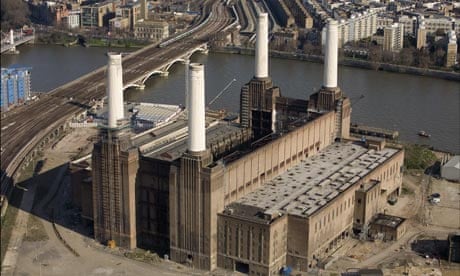Ireland's controversial new "bad bank" has overnight become one of the biggest property banks in the world after it completed the acquisition of developers' loans worth more than €70bn (£59bn).
The National Asset Management Agency now controls the loans on hotels, housing estates, shopping centres and development sites across Ireland, the UK, mainland Europe and elsewhere, including part-ownership of landmark sites such as Battersea power station.
The agency, which is charged with clearing Ireland's debt mountain, has the legal right to acquire every single land and development loan from the five main banks in the country.
The details from NAMA were released as the euro fell to a record low against the Swiss franc after Moody's downgraded some Irish and Spanish banks, fuelling investors' fears about the capacity of these troubled countries to pay their debts.
The credit agency cut the rating of Allied Irish Banks, Bank of Ireland, EBS Building Society, Irish Life & Permanent, and Irish Nationwide Building Society. The senior debt and bank deposit ratings of Anglo Irish Bank were also downgraded. The move follows last week's cut of Ireland's sovereign debt by the agency.
"The banks' debt ratings are affected by the downgrade of the Irish government, as the high degree of systemic support from the government had so far largely mitigated the pressure stemming from a much weaker standalone credit profile of these banks," Moody's said.
The problems for Spanish banks also continue to mount. The agency, which recently warned Spain about a possible sovereign debt downgrade, placed the debt ratings of 30 Spanish banks on review for a possible cut.
NAMA also announced that it had wrested €130m from unnamed developers who were trying to escape from its clutches by transferring property assets to their wives. In all, NAMA has acquired some 11,000 loans with a nominal value of €71.5bn from developers at the centre of the property crash in Ireland.
A spokesman said no geographical breakdown would be provided, but details released this year show that at least €10bn relates to property in the UK owned by the top 30 developers in the country. Last night the chairman of NAMA, Frank Daly, said developers had done enormous "damage" to the country and should work for nothing to help the state recoup the money for tax payers.
"A lot of these people have done an awful lot of damage to the country and they really should work for nothing for the country. That's the sort of anger I feel and the degree of upset I feel about this," Daly told RTE television.
Although NAMA has a policy of not naming developers now under its wing or the assets it has just acquired, some of London's best-known landmarks including Battersea power station, Bow Street magistrates court and the Pan Peninsula Ontario Towers in Docklands were bought or built by developers now in the bad bank. NAMA has paid about €30.2bn for the loans, representing an aggregate 58% discount.
One of the biggest developers affected is Real Estate Opportunities, which owns Battersea power station. It is relying on the support of NAMA to stay solvent.
Bank of Ireland contributed €100m to the €600m used to acquire Battersea at the peak of the property boom in 2006. It has renegotiated terms of the loans relating to the acquisition with Lloyds and NAMA (which bought the Bank of Ireland loan) with repayment extended to August 2011.
The loans relating to the Maybourne Group, the Irish company that owns the five star Claridges, Connaught and Berkeley hotels have not been transferred to NAMA as they are currently the subject of a Supreme Court action by its owner Paddy McKillen who has argued that his loans are all performing and should not be hoovered up by the bad bank.
Gerry Barrett, who owns Bow Street magistrates court, is also in NAMA, as is the Ballymore Group, which owns several tower blocks and has developments in and around Canary Wharf.
Developers are now required to run all their financial plans through NAMA, which said it has concluded its review of business plans from the top 30 developers which include REO, Gerry Barrett and Ballymore.
